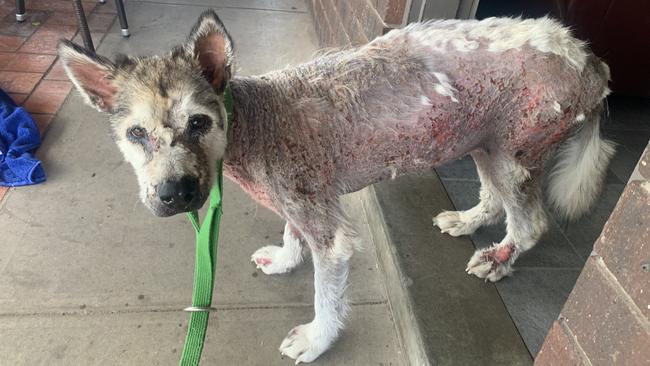Sweetheart now unrecognisable after miracle transformation
Starving and in pain from a rare skin condition, the Alaskan malamute’s future looked bleak until she found a new life with an Adelaide couple.

Pets and Wildlife
Don't miss out on the headlines from Pets and Wildlife. Followed categories will be added to My News.
Sad, withdrawn and her body covered in painful lesions as a result of a rare skin infection, Sweetheart’s future looked bleak.
After months of extensive care by the RSPCA, life took an upward turn for the Alaskan malamute when it was adopted by a funeral celebrant and end of life companion, Michelle Jewels-Parson and husband Rick Parson.
“We saw Sweetheart’s profile on the website, but there was no photo and it said that she was a special needs dog that had some ongoing medical issues,” she said.
“We organised a time to go up and see her and we just knew she was so much more than the dog that we saw that day.”

Mrs Jewels-Parson says Sweetheart had a special connection with a person dying – and hopes she will become a therapy dog to comfort and support others. .
“We brought Sweetheart along (to a home) and it was the most beautiful thing to see this dog so connected to my client,” the 51-year-old said.
“She could tell when my client was crying and upset and went straight over to her and kissed her.
“Sweetheart has been at every visit since and she’s now undertaking formal training as a therapy dog so that we can volunteer our time in hospice environments together.”
Mrs Jewels-Parson said Sweetheart was a dog saved by a community of people.

“The RSPCA has bent over backwards to liaise with our vet with her previous conditions,” she said.
“They’ve given us lots of paperwork and assessments so we knew exactly what we were getting into.
“What we didn’t realise at the time is all that care that’s given to dogs that come in that have special needs or that are really neglected, it’s all covered by donations.
RSPCA vet Dr Brooke Hasler said Sweetheart’s severe condition caused ulceration over her entire skin surface, likely to be a rare diagnosis called Erythematous multiforme.
“Medication, love and patience saw her beautiful caring nature start to shine through her pain and sadness.
“(It made) it difficult for her to walk, lie down or be touched,” Dr Hasler said, adding that she never once complained.




